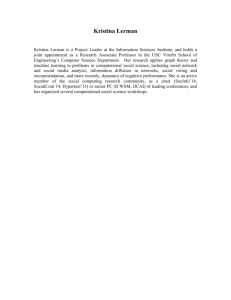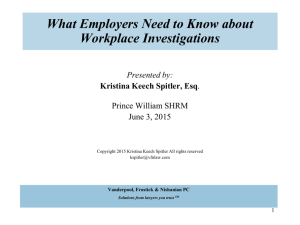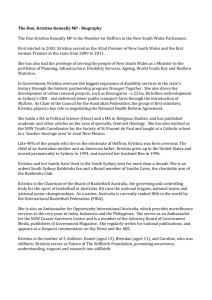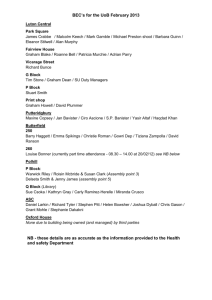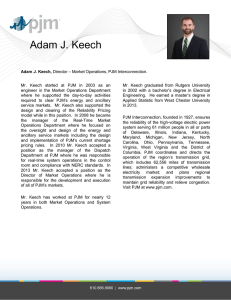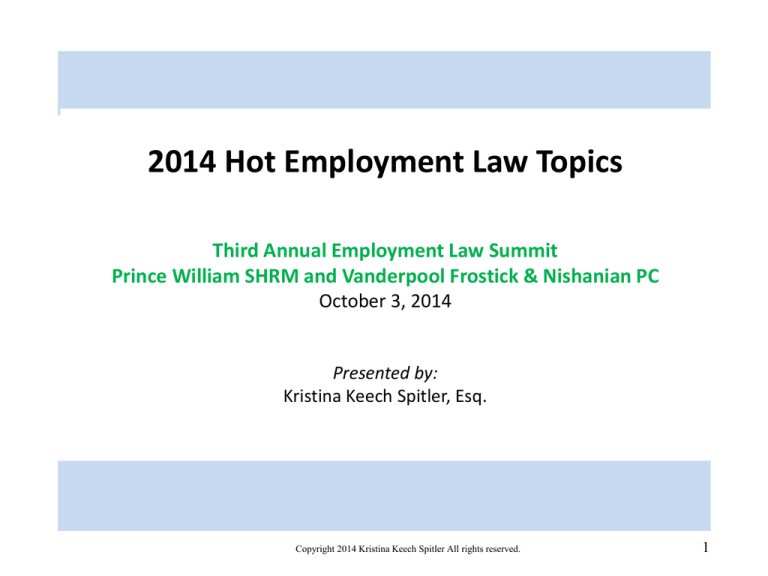
2014 Hot Employment Law Topics
Third Annual Employment Law Summit
Prince William SHRM and Vanderpool Frostick & Nishanian PC
October 3, 2014
Presented by:
Kristina Keech Spitler, Esq.
Copyright 2014 Kristina Keech Spitler All rights reserved.
1
DISCLAIMER
This presentation and information is designed to provide general information, is
not intended to constitute legal advice and should not be utilized as a substitute for
professional services in specific situations. If legal advice or other expert
assistance is required, the services of a professional should be sought.
Copyright 2014 Kristina Keech Spitler. All rights reserved.
2
Kristina Keech Spitler, Esq.
3
Kristina Keech Spitler, Esq. is a shareholder with the law firm, Vanderpool, Frostick &
Nishanian, P.C., where she represents and advises businesses on business and employment
issues and litigation including representing employers in court, in mediation, and before
administrative agencies such as EEOC, assisting clients comply with laws on such issues as
discrimination, disabilities and accommodations, wage and hour, leave, hiring and firing , and
discipline. In addition, her practice includes drafting and updating handbooks and policies,
providing management and employee training, performing internal investigations, and
counseling on matters relating to breach of agreements, non-competes and restrictive covenant
agreements. Ms. Spitler is a highly rated speaker and trainer on employment law issues.
Ms. Spitler has been recognized as one of one of Virginia’s “Most Influential Women” by
Virginia Lawyers Media and as one of Virginia’s “Legal Elite” in Labor/Employment Law by
Virginia Business Magazine.
Contact Ms. Spitler at kspitler@vfnlaw.com or (703) 369-4738.
Copyright 2014 Kristina Keech Spitler. All rights reserved.
3
Big Picture
“You can’t connect the dots looking forward;
You can only connect them looking backwards.”
- Steve Jobs
Copyright 2014 Kristina Keech Spitler. All rights reserved.
4
Big Picture
• Coming out of the worst recession since the Great
Depression in 1930’s
• Analysis of the cause of this recession
• Focus on corporate failure to comply with laws
(particularly financial and investment institutions)
• Bernie Madoff’s undetected long-term fraud on
investors
New laws; revised regulations; efforts to
encourage whistleblowers to bring corporate
wrongdoing to light; and increased enforcement efforts
Copyright 2014 Kristina Keech Spitler. All rights reserved.
5
Big Picture
Shift from a culture in which corporations and
individuals maximized their profitability, perhaps at the
expense of complying with laws and which doing so
was more accepted and rewarded:
• the laws don’t apply to me
• corporation or individual recognizes it was wrong
only if caught
• I did not know that was wrong
Copyright 2014 Kristina Keech Spitler. All rights reserved.
6
Big Picture
Now, compliance with the law is more of a focus and
expectation.
HR, new industry “compliance officers,” and attorneys
will be needed to help businesses be proactive in
complying with the laws including those on antidiscrimination, NLRA, FMLA, FLSA, Fair Credit Reporting
Act, Sarbanes-Oxley Act, Foreign Corrupt Practices Act,
good corporate governance ....
Copyright 2014 Kristina Keech Spitler. All rights reserved.
7
Big Picture
These trends effect both governmental entities as well
as workers:
• Increased regulatory activity by many governmental
agencies (Presidential Executive Orders, changing old
interpretations of laws and regulations; new laws,
more enforcement efforts)
• Increased knowledge of the laws and their rights by
those working for businesses
Copyright 2014 Kristina Keech Spitler. All rights reserved.
8
Agenda
Employment Law Hot Topics
Copyright 2014 Kristina Keech Spitler. All rights reserved.
9
Agenda
Employment Law Hot Topics
• Developments Regarding Discrimination Issues
• Challenges to Company Policies and Severance
Agreement Language
• Continuing Focus on Violations of the Fair Labor
Standards Act
Copyright 2014 Kristina Keech Spitler. All rights reserved.
10
Discrimination Issues
Counsel: Have you every been discriminated against,
harassed, suffered in a hostile work environment, or
had an action taken against you because of:
•
•
•
•
•
Race/skin color
Age (40+ years)
National origin
Disability
Religion
•
•
•
•
Genetic Information
Sex
Military Status
Pregnancy
Copyright 2014 Kristina Keech Spitler. All rights reserved.
11
Discrimination Issues
Increased focus on discrimination against women
• Pregnancy Discrimination
• Discriminatory pay and other practices that help contribute to
gap in pay between women and men
• Increase in minimum wage for low paying positions as more
women are in low paying jobs
Copyright 2014 Kristina Keech Spitler. All rights reserved.
12
Discrimination Issues
Pregnancy Discrimination
Young v. United Parcel Service, Inc. - 2013
• Female employee requested light duty after becoming
pregnant. UPS had policies that granted light duty to
employees if injured on the job per CBA, if lost DOT
certification per CBA, or if disabled under ADA. Since
employee was not disabled, UPS denied employee light duty
and provided her extended leave of absence instead.
• After birth of her child, employee returned and filed suit
alleging discrimination in violation of Pregnancy
Discrimination Act and violation of ADA (among other claims)
Copyright 2014 Kristina Keech Spitler. All rights reserved.
13
Discrimination Issues
Pregnancy Discrimination
Young v. United Parcel Service, Inc. - 2013
• District Court in Maryland granted UPS summary judgment
• 4th Cir. Ct. of Appeals affirmed the lower court’s decision to
grant UPS summary judgment and dismiss employee’s suit
finding that the employee was not perceived as disabled and
UPS’s light duty policy was pregnancy-neutral which is all that
the PDA requires. Court rejected that PDA requires employers
to provide pregnant women with every privilege and
accommodation given to nonpregnant workers
• Ms. Young has appealed the case to the U.S. Supreme Court
which on July 1, 2014 agreed to hear the case.
Copyright 2014 Kristina Keech Spitler. All rights reserved.
14
Discrimination Issues
Pregnancy Discrimination
July 2014, EEOC issued a controversial “Enforcement
Guidance: Pregnancy Discrimination and Related Issues” which
was supported by only 3 of the 5 commissioners.
It is controversial for its view that employers must modify
job requirements for pregnant and lactating workers, even if the
pregnancy is normal and the employee is healthy and not
disabled under the meaning of either the Americans with
Disabilities Act (ADA) or state law.
Copyright 2014 Kristina Keech Spitler. All rights reserved.
15
Discrimination Issues
Pregnancy Discrimination
The EEOC’s position on this is contrary to the 4th Circuit
Court of Appeal’s holding in Young v. UPS. With the Supreme
Court getting ready to decide this issue, in the interim, you will
have to decide which position you will follow if faced with a
pregnant employee requesting light duty prior to its decision.
Copyright 2014 Kristina Keech Spitler. All rights reserved.
16
Discrimination Issues
Pregnancy Discrimination
EEOC’s Guidance further provides:
• “Leave related to pregnancy, childbirth, or related medical
conditions can be limited to women affected by those conditions.
However, parental leave must be provided to similarly situated men
and women on the same terms. If, for example, an employer
extends leave to new mothers beyond the period of recuperation
from childbirth (e.g. to provide the mothers time to bond with
and/or care for the baby), it cannot lawfully fail to provide an
equivalent amount of leave to new fathers for the same purpose.”
• In some circumstances, pregnancy related health restrictions may
now qualify as a disability under the ADA and require reasonable
accommodations.
Copyright 2014 Kristina Keech Spitler. All rights reserved.
17
Discrimination Issues
Pregnancy Discrimination
EEOC’s Guidance further provides:
• “To comply with Title VII, an employer's health insurance plan must
cover prescription contraceptives on the same basis as prescription
drugs, devices, and services that are used to prevent the
occurrence of medical conditions other than pregnancy.”
However, this is contrary to the US Supreme Court’s recent decision in
Burwell v. Hobby Lobby Stores, Inc., (June 30, 2014) in which the Court
held that, under the Religious Freedom Restoration Act, and
irrespective of other federal mandates, certain employers may not
lawfully be compelled to provide insurance covering all forms of
contraception.
Copyright 2014 Kristina Keech Spitler. All rights reserved.
18
Discrimination Issues
Example of Company’s Failure to Proactively Address
Employment Law Issues
“Westat is one of the foremost professional service
corporations of its kind—the gold standard of social science
research, statistical analysis, and evidence-based
communications.”
However, during a scheduled compliance review, OFCCP
investigators discovered that Westat used a selection process
that systematically discriminated against 3,651 African American,
Asian American, Hispanic and female job applicants at its
Rockville, MD headquarters and seven additional sites.
Copyright 2014 Kristina Keech Spitler. All rights reserved.
19
Discrimination Issues
It is also alleged to have failed to maintain and internally
audit its own records.
Westat Inc. reached a conciliation agreement with OFCCP
to pay $1.5 million in back wages and interest to the affected
applicants and make 113 job offers as positions become
available.
DOL Secretary Perez stated “For more than 50 years,
Westat has effectively harnessed the power of data to produce
ground-breaking research. That commitment to data integrity
should also be applied to its employment practices so that every
worker has a fair shot at getting a good job and company
leadership understands exactly who is getting hired and why.”
Copyright 2014 Kristina Keech Spitler. All rights reserved.
20
Unlawful Policies and Severance Agreement Language
Counsel: Has your company prohibited you from doing
something that the law entitles you to do? Have they
told you that they have a policy that states that you
cannot talk with others in the workplace about wages,
working conditions? Have they asked you to sign a
severance agreement which includes unfair provisions?
• NLRB
• EEOC
Copyright 2014 Kristina Keech Spitler. All rights reserved.
21
Unlawful Policies and Severance Agreement Language
NLRB has increased focus on non-union
workplaces and their policies and actions that may
interfere with an employee’s Section 7 “concerted
activities” rights.
As part of historic low participation in unions
(approx. 8%) and changing work environments, NLRB
started looking at company’s social media policies to
see if they chilled or violated Section 7 of NLRA (i.e.,
considered “unfair labor practices”). This has expanded
to include actively reviewing company handbooks and
severance agreements.
Copyright 2014 Kristina Keech Spitler. All rights reserved.
22
Unlawful Policies and Severance Agreement Language
The NLRA prohibits employers from interfering with, restraining,
or coercing employees in the exercise of their “Section 7” rights.
Section 7 rights are “the right to self-organization, to form, join,
or assist labor organizations, to bargain collectively through
representatives of their own choosing, and to engage in other
concerted activities for the purpose of collective bargaining or
other mutual aid or protection.”
“Concerted activity” for employees’ “mutual aid or protection” is
protected with or without a union.
- Usually group activities involving 2 or more employees
- Relates to working conditions including wages and
benefits
Copyright 2014 Kristina Keech Spitler. All rights reserved.
23
Unlawful Policies and Severance Agreement Language
NLRB is concerned about broad policies and provisions
in agreements that prohibit or would reasonably lead
an employee to believe that they are prohibited from
saying anything about the employer or that would
restrict the employee’s right to concerted activity (i.e.,
communicating about wages, benefits and work
conditions).
Copyright 2014 Kristina Keech Spitler. All rights reserved.
24
Unlawful Policies and Severance Agreement Language
December 2013 – NLRB Judge ruled that a for-profit
technical school’s policy prohibiting its employees from
gossiping ran afoul of federal labor law and that the
firing of an admissions employee for violating the rule
was therefore also unlawful.
Copyright 2014 Kristina Keech Spitler. All rights reserved.
25
Unlawful Policies and Severance Agreement Language
NLRB v. Noel Canning – U.S. Supreme Court
decided President Obama’s recess appointments to
NLRB were unconstitutional. Accordingly, the ruling
called into question NLRB’s actions over the past two
years (including GC’s Memos on unfair labor practices
for disciplining employees for social media concerted
activities) were unlawful as well.
Despite grave speculations, it was anticlimactic
when NLRB, once properly reconstituted, approved and
ratified all past actions in one fell swoop.
Copyright 2014 Kristina Keech Spitler. All rights reserved.
26
Unlawful Policies and Severance Agreement Language
Questions raised about provisions in severance
agreements that:
• prevent the employee from disclosing the
contents of the agreement with anyone other
than family, financial, or legal
• Prevent the employee from making statements or
engaging in conduct that disparages, criticizes or
otherwise causes a negative characterization of
the company nor encourage or assist anyone else
to do so
Copyright 2014 Kristina Keech Spitler. All rights reserved.
27
Unlawful Policies and Severance Agreement Language
Similar issues also raised by EEOC
February 7, 2014, EEOC sued CVS Pharmacy alleging
pattern or practice of unlawful conduct by having the
following provisions in its severance agreement signed
by its former employees over the past several years:
• Non-disparagement and non-disclosure
• Remedies including attorneys’ fees for
employee’s breach of the agreement
Case is expected to be decided soon.
Copyright 2014 Kristina Keech Spitler. All rights reserved.
28
Unlawful Policies and Severance Agreement Language
EEOC sued CollegeAmerica on April 4, 2014 challenging
a severance agreement signed by an employee who
was paid $7000. The severance agreement contained
provisions that provided that:
• employer would not contest employee’s
unemployment benefits
• employee agreed not to contact gov’t agency
• Employee would forward complaints to ER
• Non-disparagement
Copyright 2014 Kristina Keech Spitler. All rights reserved.
29
Unlawful Policies and Severance Agreement Language
The employee later filed charges with the gov’t agency.
The employer sued the employee 7 days later for
breach of the agreement. The employee filed two
retaliation charges against the employer. EEOC filed
suit against CollegeAmerica for the language in its
severance agreement.
Case expected to be decided shortly.
Copyright 2014 Kristina Keech Spitler. All rights reserved.
30
Unlawful Policies and Severance Agreement Language
Suggest review and consider revising language in your
form severance agreement in which:
• Employee agrees not to file any claim, action,
complaint, charge or other proceeding against the
company (See 29 U.S.C. §626(f)(4))
• Employee agrees to reimburse Employer for all sums
paid pursuant to the Agreement and pay Employer’s
damages if Employee files any charge or proceeding
(See 29 U.S.C. §1625.23)
Copyright 2014 Kristina Keech Spitler. All rights reserved.
31
Unlawful Policies and Severance Agreement Language
• Employee agrees to not give testimony or cooperate
with EEOC or any individual bringing a claim against
the company (Basis: may run afoul of anti-retaliation
provisions because they impose a penalty upon
those who are entitled to engage in protected
activity. See EEOC Enforcement Guidance on nonwaivable employee rights.)
• Employee agrees to withdraw EEOC charge as
condition of agreement (See 29 U.S.C. §623( d) and
Title VII (42 U.S.C. §2000e-3(a))
Copyright 2014 Kristina Keech Spitler. All rights reserved.
32
Unlawful Policies and Severance Agreement Language
• Include carve out language that covers all
governmental complaints (EEOC, NLRB, state
agencies, etc.) that nothing in agreement prevents
employee from filing a charge or complaint, or
participating in an investigation or proceeding
conducted by EEOC etc.
• Include language that nothing in Agreement is
intended to interfere with Section 7 rights.
• Narrowly draft confidentiality provisions and
provisions that prohibit employee from talking with
others
Copyright 2014 Kristina Keech Spitler. All rights reserved.
33
FLSA Violations
Counsel: Has your company in any way violated FLSA:
• unlawfully paid you as a woman less than the men;
• improperly classified you as a independent
contractor;
• improperly classified you as exempt;
• failed to pay you all of your wages;
• failed to properly pay you overtime;
• improperly deducted time from your pay?
Copyright 2014 Kristina Keech Spitler. All rights reserved.
34
FLSA Violations
DOL Strategic Plan for Fiscal Years 2014-2018
• Strategic Goal 3: Promote fair and high-quality work
environments
“When workers have a voice in the workplace – when they can communicate
with management and seek to recover workplace issues at their source – the
result is a safer, fairer, and better workplace. Yet too many workers,
especially vulnerable workers, feel that reporting workplace violations or
safety hazards threatens their job security.”
Copyright 2014 Kristina Keech Spitler. All rights reserved.
35
FLSA Violations
Strategic Objectives in support of Goal 3:
• Break down barriers to fair and diverse workplaces and
narrow wage and income inequality
• Protect workers’ rights
• Secure wages and overtime
Copyright 2014 Kristina Keech Spitler. All rights reserved.
36
FLSA Violations
Focus on
• OFCCP to strengthen enforce of affirmative action and
nondiscrimination in federal contractor workplaces (2012
year-long investigation by Senate Health, Education, Labor,
and Pensions Committee found almost 30% of top wage
and safety violators held federal contracts)
• Welfare of wage-earning women and workplace flexibility
• WHD to concentrate on fair compensation to most
vulnerable workers – agricultural and young workers,
workers in fissured industries, individuals with disabilities,
and low-wage earners
Copyright 2014 Kristina Keech Spitler. All rights reserved.
37
FLSA Violations
Equal Pay for Women and Minorities
• April 8, 2014 – President Obama signed Executive
Order 13665 instructing the Secretary of Labor to
propose a rule within 160 days to require pay
transparency among federal contractors
Copyright 2014 Kristina Keech Spitler. All rights reserved.
38
FLSA Violations
Equal Pay for Women and Minorities
• Sept. 15, 2014 – DOL’s OFCCP announced proposed
rule that would prohibit federal contractors and
subcontractors from maintaining pay secrecy
policies (amend Executive Order 11246)
-
-
Federal contractors cannot fire or otherwise discriminate
against any employee or applicant for discussing,
disclosing or inquiring about their compensation or that
of another employee or applicant.
Rule published Sept. 17 and open for public comment for
90 days
Copyright 2014 Kristina Keech Spitler. All rights reserved.
39
FLSA Violations
Independent Contractor Status
• Sept. 15, 2014 – DOL awarded $10.2 million to fund
detection of worker misclassification enforcement
activities in 19 states unemployment insurance
programs
-
-
Enhance state’s ability to detect incidents of workers
misclassified as independent contractors and protect the
integrity of unemployment insurance trust funds
First time DOL awarded grant funds for this purpose
Based upon Congress wanting to address issue
Copyright 2014 Kristina Keech Spitler. All rights reserved.
40
Conclusion
• Some part “Brave New World” yet many of the laws
have been in existence for 50-80 years.
Copyright 2014 Kristina Keech Spitler. All rights reserved.
41
Conclusion
• With the availability of information on the web and
the changed business climate/culture after the great
Recession, it is likely that the position “I didn’t know”
will not work on any governmental entity, judge or
jury.
• In addition, failing to proactively address these laws
will show that the employer did not even value the
issue enough to know what the law is and try to
comply. This will likely impact penalties, damages
and may cause significant damage to the company’s
and individual’s reputations.
Copyright 2014 Kristina Keech Spitler. All rights reserved.
42
Conclusion
There is a lot you can do to comply with the laws and
thereby avoid or reduce both
governmental investigations, enforcement, and
penalties; and
employee charges, lawsuits, and damages.
Copyright 2014 Kristina Keech Spitler. All rights reserved.
43
Conclusion
• HR professionals and administrative personnel tasked
with handling the “people” issues at work:
– Understand the big picture of the culture in which we are
doing business and help educate your management team
on the value of compliance with employment laws
– Learn and practice effective communication with your
management people so you can get their buy-in and
support for identified issues and proposed solutions
– Seek help when not sure how to handle an issue
Copyright 2014 Kristina Keech Spitler. All rights reserved.
44
Conclusion
• Business owners and managers:
– Incorporate compliance with employment laws into your
business plan (along with how to sell your products or
services) (Note that large companies are starting to hire
“compliance officers” to help them comply with FCPA,
corporate governance issues, employment and other laws)
– Provide resources and training to your managers, HR
people and administrative staff tasked with handling your
“people issues” so that they can help you comply with the
law
– Listen to and appreciate what HR is trying to explain as to
why some act is or is not a good idea in light of certain
laws
Copyright 2014 Kristina Keech Spitler. All rights reserved.
45
Conclusion
Copyright 2014 Kristina Keech Spitler. All rights reserved.
46
Thank You
Kristina Keech Spitler, Esq.
(703) 369-4738
kspitler@vfnlaw.com
Copyright 2014 Kristina Keech Spitler. All rights reserved.
47

